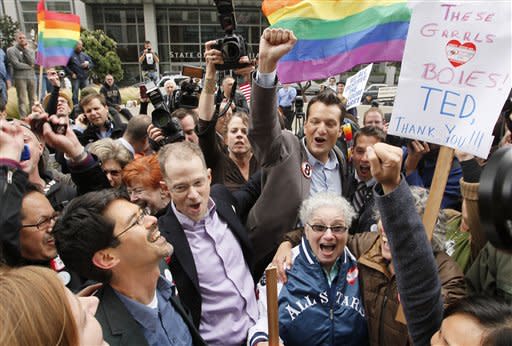 The Upshot
The UpshotWhat’s next for the Prop. 8 case?

Now that a San Francisco federal judge has overturned California's voter-approved gay marriage ban, supporters of same-sex marriage have hailed the decision as a "grand slam." But it's not quite a game-changer — the ruling by Judge Vaughn Walker, which declared that the ballot initiative outlawing gay unions in the Golden State violates the due process and equal protection clauses of the 14th Amendment to the Constitution, sets the stage for a likely Supreme Court challenge to determine the authority of the state to ban same-sex marriage.
Walker's decision marks the first federal test of a state law outlawing gay marriage. Gay-marriage opponents had earlier sought a stay on Walker's ruling, so as to prevent a decision against them from unleashing a wave of gay marriages in the state before they could mount an appeal. Prop. 8 backers say they plan to appeal the decision to the 9th U.S. Circuit Court of Appeals.
The language of Walker's decision is sweeping — which makes a Supreme Court challenge more likely than if he had elected to decide the case on narrower points of law. "The evidence shows conclusively that moral and religious views form the only basis for a belief that same-sex couples are different from opposite-sex couples," Walker wrote. He also blasted the defense's star witness and says Prop. 8 "fails to advance any rational basis in singling out gay men and lesbians for denial of a marriage license." (You can read the full decision here.)If the 9th Circuit Court of Appeals were to overturn Walker's decision, the Supreme Court may be less likely to rule on the case. In practical terms, that outcome seems unlikely, though — the 9th Circuit has long had the reputation of being the nation's liberal appellate district, with Rush Limbaugh routinely blasting it as the "Ninth Circus" for past rulings such as the 2002 finding that schools can't compel students to recite the "under God" portion of the Pledge of Allegiance. (The court recently reversed that ruling.)
Still, if the case eventually reaches the Supreme Court, conventional wisdom is that the conservative-leaning Roberts Court would not uphold a gay-marriage right, USC law professor David Cruz told a California public radio station this morning.
University of California constitutional law professor Erwin Chemerinsky tells The Upshot that a U.S. district court's decision in Massachusetts to strike down the federal Defense of Marriage Act could actually reach the Supreme Court faster than the Prop. 8 case. "I think ultimately the Supreme Court has to rule on this issue," he said.
A spokesman for the Equal Rights Foundation, a nonprofit that funded the challenge to Prop. 8, tells The Upshot that one of the main effects of the case has been to change public perception of gay marriage.
"One of the most important things about this case is that it's laid all the facts on the table," spokesman Yusef Robb said. "Both sides were given equal opportunity to present evidence and present testimony. As opposed to the political arena where spin and bumper stickers and misleading TV ads is what influences people, in a court of law the facts influence people."
Meanwhile, the pro-Prop. 8 forces are gearing up for their appeal. "We expected nothing different from Judge Vaughn Walker, given the biased way he conducted this trial," Brian Brown, president of the National Organization for Marriage, told a local paper. "With a stroke of his pen, Judge Walker has overruled the votes and values of 7 million Californians who voted for marriage as one man and one woman."
Vaughn issued a temporary stay on his ruling, so gay couples in California cannot get married yet, despite some confusion after the ruling was announced at the county clerks' offices.
Chris Geidner at Metro Weekly writes that the most important parts of the decision are Walker's "findings of fact," because his legal decisions will be considered anew when the case reaches the 9th circuit. He lists the facts here.
